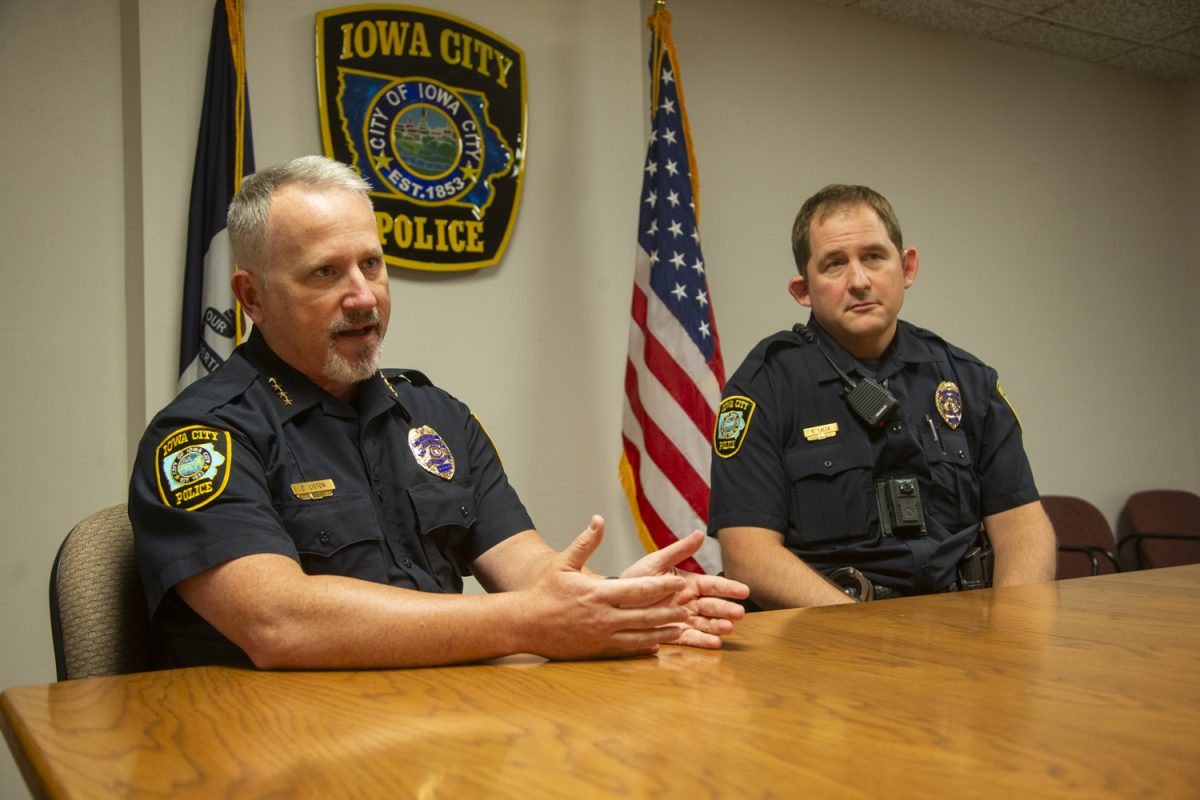For the first time in over three years, the Iowa City Police Department is nearing full capacity after hiring three new officers, one of whom brings a unique legacy as the son of the city’s first female police sergeant.
A call for applicants was issued last spring after the Iowa City council voted to raise the department’s budget by $460,000.
The Iowa City Police Department Chief of Police Dustin Liston said the goal of this hiring initiative was not to increase the size of the force but to fill the department’s existing vacancies. The staffing shortage, Liston said, was due to the COVID-19 pandemic hindering the hiring process.
“We haven’t had a real turnover problem,” Liston said. “It’s just that we weren’t hiring people for so long. It’s like once you get behind on car maintenance, you can never catch up.”
Liston said the department’s three most recent hires — Officer Kolton Johnson from Hamilton, IL, Officer Mathieux Rehnke from Solon, and Officer Gregory Lalla from Iowa City — will bring the department up to 82 officers once training is finished. The department is authorized for 85 sworn officers, according to its website.
“That’ll be close to or tied at our highest level since I’ve been here,” Liston said.
Liston said the department was especially excited to welcome Lalla, who has extensive experience in law enforcement and a personal tie to the Iowa City community.
Lalla’s mother, Vicki Lalla, was the first female Iowa City Police Department officer to be promoted to sergeant in 1994 before retiring in 2014.
“I grew up running around in this building,” Gregory Lalla said during an interview at the police station.
After graduating from City High, Gregory Lalla earned a bachelor’s degree in accounting and business administration from Coe College and a juris doctorate from Ohio University Law School. He practiced law for a year and a half before making the switch to law enforcement in 2014.
“Not one time in the last 10 years have I ever wanted to just go back to being a lawyer,” Gregory Lalla said. “I enjoy the work that we do. It’s something different every day.”
Liston said Gregory Lalla joined the force as a certified officer, meaning he is already a police academy graduate. The Iowa City Police Department has a four-month field training program for any new officer, which Liston said Gregory Lalla is in the process of completing.
The Iowa City Police Department offers a salary starting at around $60,000 but can go up to around $90,000 for certified officers with experience. There is also a $5,000 signing bonus for academy-certified officers, according to the department’s recruitment page.
Gregory Lalla said while the salary offered by the Iowa City Police Department wasn’t the main factor in his decision, it made the transition to patrol officer feasible after his 10 years as a sergeant in Davenport.
Liston noted that the Iowa City Police Department’s policy of offering competitive pay is specifically designed to attract experienced candidates like Gregory Lalla, even though all new hires start at the same level within the force.
RELATED: Iowa City police seeks new officers in hopes to reach full staffing levels
“Everyone starts out as a patrol officer,” Liston said. “Our priority is patrol because they’re the ones who respond when you call 911. As we get all of those positions filled, then we can transition other people over into some specialty positions.”
Iowa City Councilor Shawn Harmsen, who supported last year’s budget increase, said improved staffing levels allow the department to focus more on community policing efforts, such as the department’s downtown liaison officer.
The downtown liaison officer’s role is to strengthen relationships with downtown businesses and visitors through public education, proactive patrols, and homeless outreach, according to the department’s website.
“Our downtown liaison does a lot of work with trying to help provide and connect people who are unhoused with housing opportunities, and sometimes that takes a while to build that rapport and relationship,” Harmsen said. “Now that we are up to closer staffing, we have more of the capacity to do more community policing.”
He also emphasized the importance of hiring a second sexual assault investigator, made possible by the budget boost.
“It’s abhorrent that it’s necessary, but it’s even worse if we leave [survivors] waiting longer for a response because we didn’t dedicate enough resources into that investigative capacity,” Harmsen said.
Beyond the investigative needs, improved staffing has had a noticeable effect on officer morale and workload, Liston explained.
“When you have an officer who’s working 16-hour shifts because he or she has to cover another shift, that can get hard, and morale can start to go down,” Liston said. “We are in a better place than we have been for a long time.”



